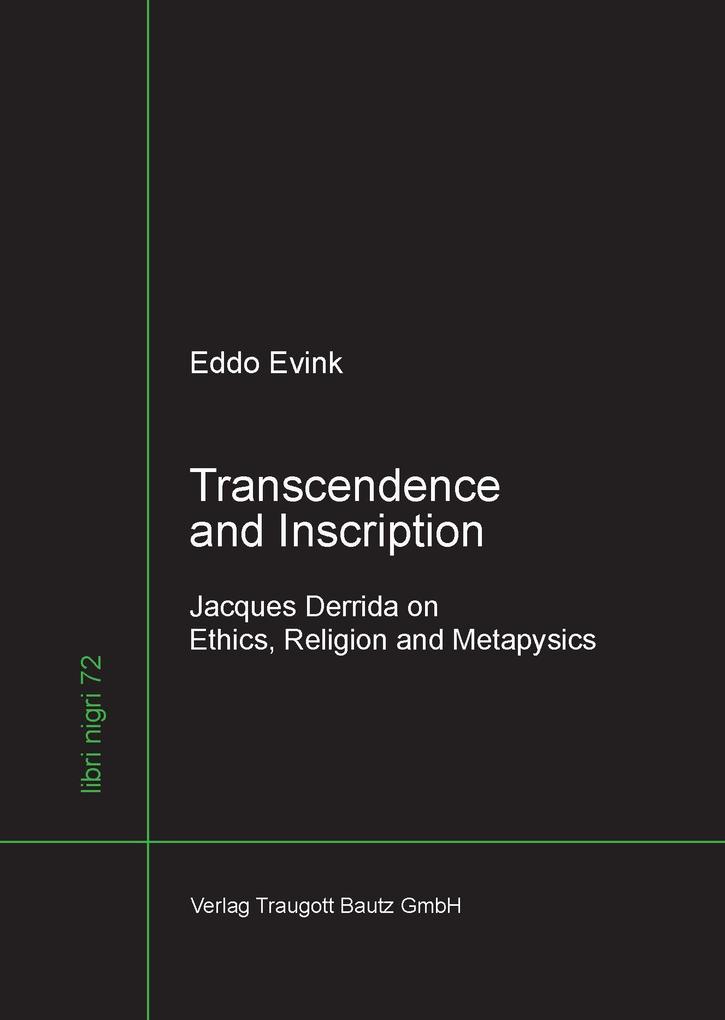
Sofort lieferbar (Download)
The philosophy of Jacques Derrida is one of the milestones of twentieth century thought and is still of great influence in many disciplines today. This book offers a survey of many aspects of Derrida's work, mainly focusing on the significance of his thoughts for the domains of ethics, politics and religion. The main thesis of this study is that the key to a fruitful evaluation of the strong and weak points of his work can be found in its ambiguous relation to the metaphysical tradition. Usually Derrida's ideas, and deconstruction as it is practiced and manifested by many others, are seen as a critique of metaphysics. This is true, but it is also just one side of the matter. In many cases, especially in by far the most of Derrida's texts, deconstructions are as well a continuation and even an affirmation of the metaphysical tradition. Despite his continuous critique of metaphysical ways of thought, and despite the deconstructions of metaphysical constructions, Derrida's own style of thinking and writing is still driven by a metaphysical desire that includes a "hubris of metaphysics". Through this perspective, this study provides a profound evaluation of the significance of Derrida's philosophy for ethics, politics and religion.
Inhaltsverzeichnis
Introduction
1. HIGH-FLOWN AMBITIONS ON METAPHYSICS, TRANSCENDENTAL PHILOSOPHY, PRETENSIONS AND LIMITATIONS
1.1 Classical metaphysics
1.1.1 The classic metaphysical intention
1.1.2 Hubris
1.1.3 Augustine and Thomas Aquinas
1.1.4 Kant and Hegel
1.2 Nietzsche s radical critique of metaphysics
1.3 Phenomenology and philosophies of difference
1.3.1 Heidegger
1.3.2 Levinas
1.4 Religiously inspired critique of metaphysics
1.4.1 Reformational Philosophy
1.4.2 Duintjer
1.5 What is metaphysics? Or: the inevitability of hubris
2. ICARUS WAX DERRIDA S QUASI-TRANSCENDENTAL (CRITIQUE OF) METAPHYSICS
2.1 Metaphysics, logocentrism, phonocentrism
2.2 Writing, trace, play
2.3 Original supplement
2.4 Deconstruction
2.5 Quasi-transcendental differences
2.6 At the limit of metaphysics
2.6.1 The closure of metaphysics
2.6.2 Beyond Kant vs. Hegel
2.6.3 Beyond Heidegger vs. Levinas
2.6.4 The community of the question
2.6.5 Derrida and the classic metaphysical intention
3. ETHICS IN DECONSTRUCTION
3.1 The ethical dimension in Derrida s work
3.2 Law and justice
3.3 Laws and justice
3.4 Responsibility and decision
3.5 Gift and economy
3.5.1 Giving
3.5.2 Forgiveness
3.5.3 Hospitality
3.6 Politics in deconstruction
3.6.1 Between legacy and eschaton
3.6.2 The coming democracy, a community without community
3.6.3 Messianic Marxism
3.6.4 Enlightened European openness
4. FAITH IN DECONSTRUCTION
4.1 The name of confusion
4.2 Negative theology Approaching God
4.2.1 Negative theology as language
4.2.2 Promise
4.2.3 Prayer
4.2.4 Secret
4.2.5 Place
4.3 Universal apophatics
4.3.1 Every other is wholly other
4.3.2 Revelation and revealability
4.3.3 The messianic
4.3.4 Khôra
4.4 Faith, politics, rationality
4.4.1 Politics and religion
4.4.2 Faith and reason
4.5 Ethics, sacrifice, economy
4.5.1 Religion and responsibility
4.5.2 Binding Isaac: sacrifice and economy
4.5.3 God sees into the invisible: sacrifice and economy
4.6 A Jewish philosophy
5. DAEDALUS WINGS QUASI-TRANSCENDENTAL CRITIQUE, METAPHYSICS AND HUBRIS
5.1 Derrida s critics
5.1.1 Habermas
5.1.2 Gadamer
5.1.3 Searle and Graff
5.2 Quasi-transcendental metaphysics
5.2.1 Derrida s metaphysics
5.2.2 as testimony
5.3 Quasi-transcendental metaphysics and ethics
5.3.1 Ethics and ethnicity
5.3.2 Accountability
5.3.3 Counter-productive consequences
5.3.4 From infinite to finite responsibility
5.4 Quasi-transcendental metaphysics and religion
5.4.1 Religion, rationality and pluralism
5.4.2 Jewish philosophy and its alternatives
5.5 Icarus and Daedalus finitude and potential of philosophy
Bibliodiscography
Abbreviations
Works by Jacques Derrida
Interviews and debates
Other cited works
1. HIGH-FLOWN AMBITIONS ON METAPHYSICS, TRANSCENDENTAL PHILOSOPHY, PRETENSIONS AND LIMITATIONS
1.1 Classical metaphysics
1.1.1 The classic metaphysical intention
1.1.2 Hubris
1.1.3 Augustine and Thomas Aquinas
1.1.4 Kant and Hegel
1.2 Nietzsche s radical critique of metaphysics
1.3 Phenomenology and philosophies of difference
1.3.1 Heidegger
1.3.2 Levinas
1.4 Religiously inspired critique of metaphysics
1.4.1 Reformational Philosophy
1.4.2 Duintjer
1.5 What is metaphysics? Or: the inevitability of hubris
2. ICARUS WAX DERRIDA S QUASI-TRANSCENDENTAL (CRITIQUE OF) METAPHYSICS
2.1 Metaphysics, logocentrism, phonocentrism
2.2 Writing, trace, play
2.3 Original supplement
2.4 Deconstruction
2.5 Quasi-transcendental differences
2.6 At the limit of metaphysics
2.6.1 The closure of metaphysics
2.6.2 Beyond Kant vs. Hegel
2.6.3 Beyond Heidegger vs. Levinas
2.6.4 The community of the question
2.6.5 Derrida and the classic metaphysical intention
3. ETHICS IN DECONSTRUCTION
3.1 The ethical dimension in Derrida s work
3.2 Law and justice
3.3 Laws and justice
3.4 Responsibility and decision
3.5 Gift and economy
3.5.1 Giving
3.5.2 Forgiveness
3.5.3 Hospitality
3.6 Politics in deconstruction
3.6.1 Between legacy and eschaton
3.6.2 The coming democracy, a community without community
3.6.3 Messianic Marxism
3.6.4 Enlightened European openness
4. FAITH IN DECONSTRUCTION
4.1 The name of confusion
4.2 Negative theology Approaching God
4.2.1 Negative theology as language
4.2.2 Promise
4.2.3 Prayer
4.2.4 Secret
4.2.5 Place
4.3 Universal apophatics
4.3.1 Every other is wholly other
4.3.2 Revelation and revealability
4.3.3 The messianic
4.3.4 Khôra
4.4 Faith, politics, rationality
4.4.1 Politics and religion
4.4.2 Faith and reason
4.5 Ethics, sacrifice, economy
4.5.1 Religion and responsibility
4.5.2 Binding Isaac: sacrifice and economy
4.5.3 God sees into the invisible: sacrifice and economy
4.6 A Jewish philosophy
5. DAEDALUS WINGS QUASI-TRANSCENDENTAL CRITIQUE, METAPHYSICS AND HUBRIS
5.1 Derrida s critics
5.1.1 Habermas
5.1.2 Gadamer
5.1.3 Searle and Graff
5.2 Quasi-transcendental metaphysics
5.2.1 Derrida s metaphysics
5.2.2 as testimony
5.3 Quasi-transcendental metaphysics and ethics
5.3.1 Ethics and ethnicity
5.3.2 Accountability
5.3.3 Counter-productive consequences
5.3.4 From infinite to finite responsibility
5.4 Quasi-transcendental metaphysics and religion
5.4.1 Religion, rationality and pluralism
5.4.2 Jewish philosophy and its alternatives
5.5 Icarus and Daedalus finitude and potential of philosophy
Bibliodiscography
Abbreviations
Works by Jacques Derrida
Interviews and debates
Other cited works
Mehr aus dieser Reihe
Produktdetails
Erscheinungsdatum
26. April 2019
Sprache
englisch
Seitenanzahl
347
Reihe
libri nigri, 72
Autor/Autorin
Eddo Evink
Verlag/Hersteller
Kopierschutz
ohne Kopierschutz
Family Sharing
Ja
Produktart
EBOOK
Dateiformat
PDF
ISBN
9783959487047
Entdecken Sie mehr
Bewertungen
0 Bewertungen
Es wurden noch keine Bewertungen abgegeben. Schreiben Sie die erste Bewertung zu "Transcendence and Inscription" und helfen Sie damit anderen bei der Kaufentscheidung.

































